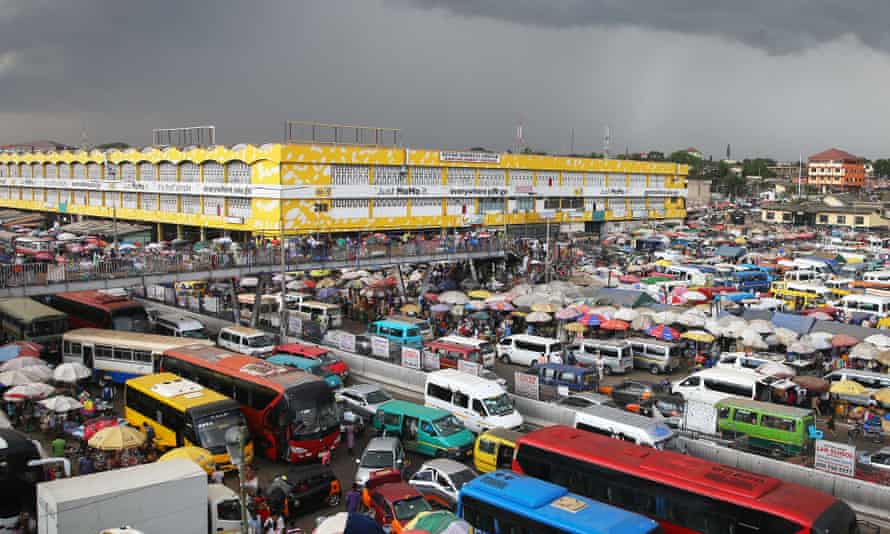
At her shop in Accra’s sprawling Kantamanto market – one of the largest for second-hand clothes in west Africa – Cynthia Bentum sits on top of a mound of goods imported from Guangzhou and Manchester.
Many who trawl through her clothes are traders themselves and pay via their mobile phones, so the decision by Ghana’s government this week to tax all electronic payments has left Bentum, 49, frustrated.
“The main mode of payment is MoMo,” she says, referring to the mobile money service by MTN, the largest provider in the country. “Why board vehicles to come and pay when mobile money payment makes it easier?
“I’m not against taxes but I think this particular tax is unnecessary. First of all, look at the cost involved in importing goods into the country. The freight charges are outrageous. Now they want us to pay an e-levy – for what? This is going to affect me seriously and I may end up losing customers, which will eventually affect my business.”
Many in Ghana feel similarly bitter. Kofi Brobbey sells spare parts from his store nearby. After being robbed he began using mobile money more often, especially to buy fuel. “I don’t want to pay with MoMo any more because I’m going to be taxed on top of the price for the fuel. Does this make sense at all? Where is the digitalisation they promised us? We’ve been deceived, and now the reality is dawning on us.”
An e-levy adding 1.5% tax on all electronic and merchant payments, bank transfers and inward remittances of more than 100 cedis (£10) passed in Ghana’s parliament on 29 March, and will come into effect in May. It has sparked widespread anger about the impact on people’s incomes, and warnings it could reduce the use of mobile payments, which are hugely popular in Ghana.

Ghana’s economy, often lauded by officials as one of the most thriving in Africa, has faced big challenges in recent years, in part caused by the impact of the pandemic. Inflation reached 15.7% in February, the highest since 2016, fuelling a cost of living crisis. Ghana’s currency has depreciated by 20% over the past year.
In a state of the nation address on Wednesday, the president acknowledged the challenges. “The Ghanaian people are anxious about the economy, the cost of living, income levels … We are aware that we are in difficult times, and we are addressing the situation.”
The government has said the policy will widen the tax base in Ghana to include the informal sector, where around 85% of Ghanaians are employed. But it has been roundly condemned by the opposition, trade groups and civil society, who say it will hit Ghanaians already struggling, and risks reversing the trend towards digital transfers.
Ghana’s government has heavily promoted mobile and digital payments, spurring a fast-growing industry. Financial technology firms and startups have attracted millions of dollars in funding. Some commentators have expressed concern the e-levy could dent the sector.
Mobile phone payments have become ubiquitous in a country where only 42% of people have a bank account. The Covid pandemic has only entrenched its importance. In 2020, the total value of transactions by mobile was more than 500bn cedis (£50bn), and more than doubled the following year.
Mavis Bampoe, 51, founded the Vision Montessori school in Accra 10 years ago. “Before coronavirus, I used to have parents queueing at the cashier’s cubicle to pay school fees,” she says. “Then parents transitioned to making mobile payments that were faster and more convenient”.

But they have already begun reverting to cash payments in recent months, she says, since it became clear that the e-levy was coming. “If a parent wants to pay fees, they must first transfer money from their bank account to their mobile money wallet. That attracts a charge from the telecoms companies, plus another 1.5% of the e-levy.
“After the money has been transferred into their wallet, that parent will now have to send it into my school’s wallet, and that is going to attract another telecoms charge, plus the 1.5% e-levy.”
Franklin Cudjoe, director of Imani Africa, a policy thinktank, says people in the country understand the challenging economic times but the policy still feels unacceptable. “It’s just difficult for people to understand why it’s being introduced now. Then also the rate itself is too high. It should have been closer to 0.5%.”
… we have a small favour to ask. Millions are turning to the Guardian for open, independent, quality news every day, and readers in 180 countries around the world now support us financially.
We believe everyone deserves access to information that’s grounded in science and truth, and analysis rooted in authority and integrity. That’s why we made a different choice: to keep our reporting open for all readers, regardless of where they live or what they can afford to pay. This means more people can be better informed, united, and inspired to take meaningful action.
In these perilous times, a truth-seeking global news organisation like the Guardian is essential. We have no shareholders or billionaire owner, meaning our journalism is free from commercial and political influence – this makes us different. When it’s never been more important, our independence allows us to fearlessly investigate, challenge and expose those in power.









